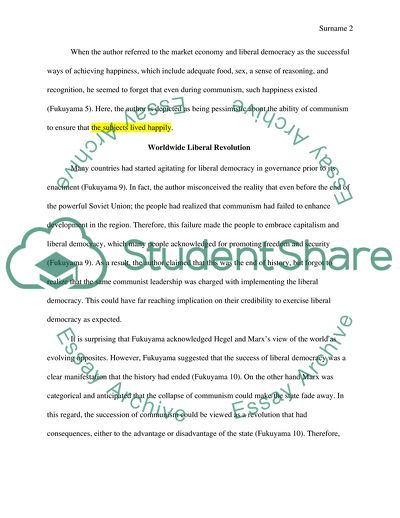Cite this document
(The position against which Fukuyama is arguing in The End of History Literature review Example | Topics and Well Written Essays - 1250 words, n.d.)
The position against which Fukuyama is arguing in The End of History Literature review Example | Topics and Well Written Essays - 1250 words. https://studentshare.org/politics/1768118-the-position-against-which-fukuyama-is-arguing-in-the-end-of-history-and-the-last-man-of-introduction-chapter-1-and-chapter-4
The position against which Fukuyama is arguing in The End of History Literature review Example | Topics and Well Written Essays - 1250 words. https://studentshare.org/politics/1768118-the-position-against-which-fukuyama-is-arguing-in-the-end-of-history-and-the-last-man-of-introduction-chapter-1-and-chapter-4
(The Position Against Which Fukuyama Is Arguing in The End of History Literature Review Example | Topics and Well Written Essays - 1250 Words)
The Position Against Which Fukuyama Is Arguing in The End of History Literature Review Example | Topics and Well Written Essays - 1250 Words. https://studentshare.org/politics/1768118-the-position-against-which-fukuyama-is-arguing-in-the-end-of-history-and-the-last-man-of-introduction-chapter-1-and-chapter-4.
The Position Against Which Fukuyama Is Arguing in The End of History Literature Review Example | Topics and Well Written Essays - 1250 Words. https://studentshare.org/politics/1768118-the-position-against-which-fukuyama-is-arguing-in-the-end-of-history-and-the-last-man-of-introduction-chapter-1-and-chapter-4.
“The Position Against Which Fukuyama Is Arguing in The End of History Literature Review Example | Topics and Well Written Essays - 1250 Words”. https://studentshare.org/politics/1768118-the-position-against-which-fukuyama-is-arguing-in-the-end-of-history-and-the-last-man-of-introduction-chapter-1-and-chapter-4.


